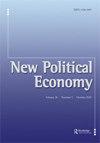Crisis management, new constitutionalism, and depoliticisation: recasting the politics of austerity in the US and UK, 2010–16
IF 3.8
2区 经济学
Q1 ECONOMICS
引用次数: 0
Abstract
ABSTRACT Political economy literature has sought to explain the rapid shift from fiscal stimulus to austerity after the 2008 crisis. Influential contributions highlight the relative explanatory value of ideational or structural factors in contributing to post-crisis austerity. Drawing on Stephen Gill’s (1998) analysis of new constitutionalism and Peter Burnham’s (2001) understanding of depoliticisation, I contend that these frameworks offer a more useful lens to understand how post-2010 austerity in the US and UK was shaped by an enduring consensus on macroeconomic policy governance consolidating during the 1990s. Examining the role of fiscal mechanisms such as PAYGO in the US and the ‘Fiscal Golden Rules’ in the UK, and the operational independence conferred to central banks, I illustrate how Third Way governments institutionalised budgetary reforms and distanced macroeconomic policymaking from popular political contestation. Despite temporary lapses with this logic of fiscal restraint, as well as the rollout of historic monetary policies after 2008, I argue that these practices became deeply embedded within state institutions. Focusing on PAYGO in the US and the OBR in the UK, I show how policymakers redeployed policies and practices from the 1990s amidst the 2008 crisis to externalise responsibility for implementing austerity measures.危机管理、新宪政与去政治化:重塑2010 - 2016年英美紧缩政治
摘要政治经济学文献试图解释2008年危机后从财政刺激到紧缩的快速转变。有影响力的贡献突出了概念或结构因素在促成危机后紧缩方面的相对解释价值。根据Stephen Gill(1998)对新宪政的分析和Peter Burnham(2001)对非政治化的理解,我认为这些框架为理解美国和英国2010年后的紧缩政策是如何由20世纪90年代巩固宏观经济政策治理的持久共识所形成的提供了一个更有用的视角。通过研究美国的PAYGO和英国的“财政黄金规则”等财政机制的作用,以及赋予央行的运营独立性,我展示了第三方政府如何将预算改革制度化,并将宏观经济政策制定与大众政治争论拉开距离。尽管这种财政约束的逻辑暂时失效,以及2008年后历史性货币政策的推出,我认为这些做法已经深深植根于国家机构中。关注美国的PAYGO和英国的OBR,我展示了政策制定者如何在2008年危机中重新部署20世纪90年代的政策和做法,以将实施紧缩措施的责任外部化。
本文章由计算机程序翻译,如有差异,请以英文原文为准。
求助全文
约1分钟内获得全文
求助全文
来源期刊

New Political Economy
Multiple-
CiteScore
10.10
自引率
9.50%
发文量
41
期刊介绍:
New Political Economy aims to create a forum for work which combines the breadth of vision which characterised the classical political economy of the nineteenth century with the analytical advances of twentieth century social science. It seeks to represent the terrain of political economy scholarship across different disciplines, emphasising original and innovative work which explores new approaches and methodologies, and addresses core debates and issues of historical and contemporary relevance.
 求助内容:
求助内容: 应助结果提醒方式:
应助结果提醒方式:


